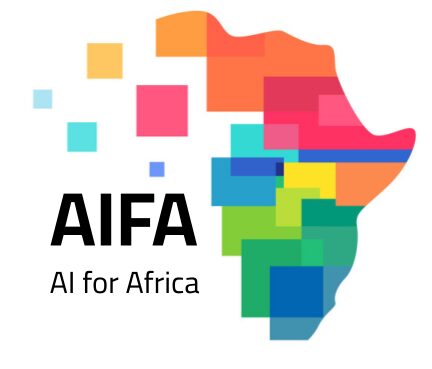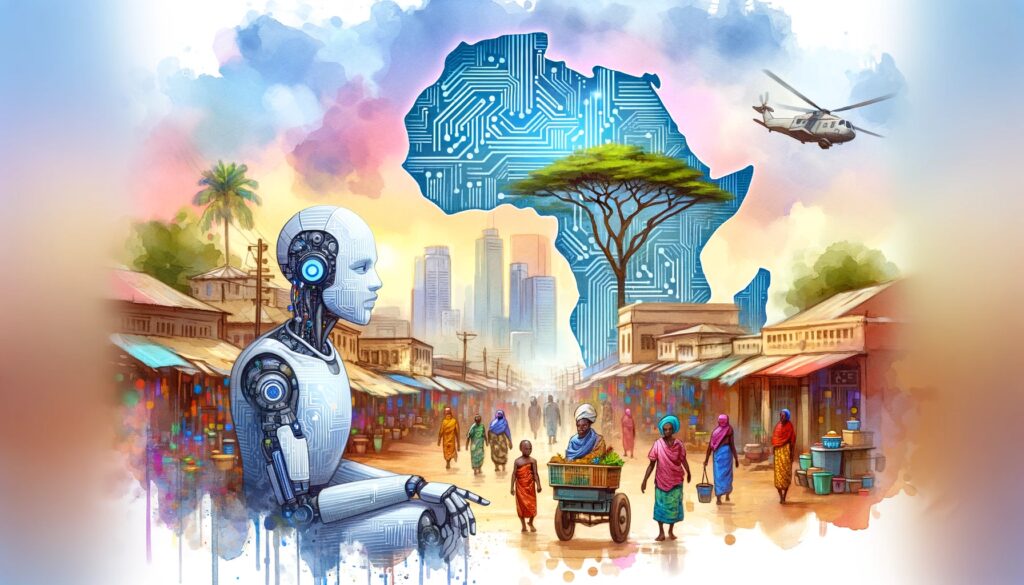
- Africa's AI Revolution Gains Momentum Despite Challenges
- Africa's AI Revolution: Harnessing Talent and Innovation for Transformative Change
- I. Rich Human Capital and Talent Pool
- II. Unique Market Opportunities
- III. International Collaboration and Partnerships
- IV. Government Support and Policy Frameworks
- V. Community Engagement and Inclusive Development
- VI. Resilience and Adaptability
- Successful AI Projects in Africa
- AIFA (AI for Africa): Goals
- How can African startups access funding for AI projects?
- Venture Capital and Angel Investors
- Government Grants and Programs
- International Development Funds and NGOs
- Corporate Partnerships and Investments
- Accelerators and Incubators
- Crowdfunding Platforms
- Competitions and Prizes
- University and Research Institution Grants
- Impact Investors
- Grants from International Organizations
- Tips for Accessing Funding:
- Exploring AI Frontiers: Key Interview Topics with African Innovators
Africa’s AI Revolution Gains Momentum Despite Challenges
Amidst Africa’s bustling landscapes and vibrant cultures, a new frontier of innovation is emerging: artificial intelligence (AI). This diverse continent, characterized by rich human capital, unique market dynamics, and resilient spirit, holds the potential to tackle AI development challenges head-on and pave the way for transformative change. From its youthful population eager to engage in technology to its burgeoning entrepreneurial ecosystem, Africa is poised to harness AI’s power for economic growth and social progress.
With international collaboration, supportive government policies, and a commitment to inclusive development, Africa stands ready to overcome obstacles and seize AI’s opportunities.
Addressing Local Challenges
- AI for Healthcare: Tailored AI technologies can revolutionize healthcare access, improve diagnosis accuracy, and enhance treatment options across Africa.
- Agricultural Productivity: AI can boost agriculture by optimizing crop management, predicting yields, and improving supply chains.
- Education Quality: AI-powered tools can personalize learning, bridge educational gaps, and support teachers.
- Infrastructure Development: AI can aid in planning and maintaining infrastructure projects, making them more efficient and sustainable.
Leapfrogging Development
- Rapid Advancements: With strategic investments and supportive policies, Africa has the potential to bypass traditional development stages, rapidly advancing key sectors through AI.
Data Accessibility
- Data Collection Innovations: Mobile phones, IoT devices, and satellite imagery offer new avenues for data collection in Africa.
- Infrastructure Improvements: Enhancing data infrastructure and promoting data sharing can unlock AI’s full potential.
Local Talent Development
- Education and Training: Investing in AI education and training programs can develop a skilled workforce of data scientists, machine learning engineers, and AI researchers.
- Research Hubs and Partnerships: Establishing AI research hubs and fostering academic partnerships can support talent development.
Entrepreneurship and Innovation
- Startup Ecosystem: Africa’s burgeoning startup ecosystem, with a growing number of AI-focused startups, addresses local needs.
- Support for Entrepreneurs: Incubators, accelerators, and funding opportunities can foster the growth of AI-driven solutions.
Policy and Regulation
- Governance: Developing appropriate policies and regulations for AI governance, data privacy, and ethical use is essential.
- Collaborative Efforts: Governments, industry stakeholders, and civil society must work together to create a conducive regulatory environment.
Infrastructure Investment
- Connectivity and Power: Improving internet connectivity, power supply, and cloud computing services is fundamental.
- Public-Private Partnerships: Cooperation can accelerate infrastructure development.
Inclusive Development
- Bridging the Digital Divide: Ensuring AI benefits reach all segments of society, including marginalized communities, is crucial.
- Promoting Digital Literacy: Initiatives to enhance digital literacy can reduce inequalities.
Addressing Challenges
- Access to Data: Enhancing data availability and quality, particularly for localized contexts and diverse languages.
- Skills Gap: Addressing the shortage of skilled professionals in AI-related fields through improved education and training.
- Financial Constraints: Securing funding and resources for AI research, infrastructure, and talent acquisition.
- Ethical and Regulatory Frameworks: Developing guidelines for data privacy, algorithmic bias, and accountability.
- Localization and Adaptation: Adapting AI technologies to fit African contexts and cultural nuances.
- Brain Drain: Mitigating the emigration of skilled professionals and fostering local capacity building.
- Intellectual Property Rights: Addressing IP rights and technology transfer issues to enhance collaboration.
- Infrastructure Security: Strengthening cybersecurity measures to protect AI technologies and data assets.
- Digital Divide: Bridging disparities in access to AI technologies and opportunities through inclusive policies and initiatives.
By addressing these opportunities and challenges, Africa can harness the transformative potential of AI to drive sustainable development, foster innovation, and improve the well-being of its people. Collaboration between governments, the private sector, academia, and civil society will be crucial in realizing this vision.
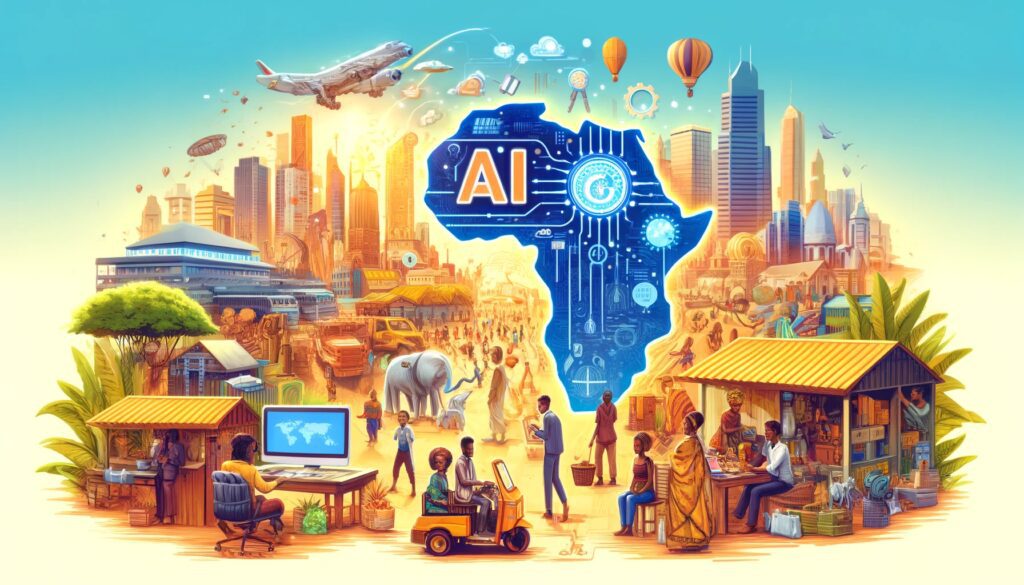
Africa’s AI Revolution: Harnessing Talent and Innovation for Transformative Change
Africa is poised to harness AI’s power for economic growth and social progress. With international collaboration, supportive government policies, and a commitment to inclusive development, Africa stands ready to overcome obstacles and seize the opportunities that AI presents.
I. Rich Human Capital and Talent Pool
A. Youthful Demographic:
Africa boasts a youthful population, offering a vast pool of talent eager to engage in technology and innovation.
B. Entrepreneurial Spirit:
The continent’s vibrant entrepreneurial ecosystem fosters innovation and creativity, providing fertile ground for AI development.
II. Unique Market Opportunities
A. Local Solutions for Local Challenges:
Africa’s diverse landscapes and socio-economic contexts present unique opportunities for developing AI solutions tailored to address local needs.
B. Emerging Markets:
Rapid urbanization and growing middle-class populations in African cities create new markets and demand for AI-driven products and services.
III. International Collaboration and Partnerships
A. Global Support and Investment:
International organizations, tech companies, and development agencies are increasingly investing in AI initiatives in Africa, providing funding, expertise, and technology transfer opportunities.
B. Knowledge Exchange and Capacity Building:
Collaborating with global partners facilitates knowledge exchange, capacity building, and skill development in AI-related fields, empowering African innovators and researchers.
IV. Government Support and Policy Frameworks
A. Strategic Prioritization:
Governments across Africa are recognizing the importance of AI for economic growth and development, prioritizing AI initiatives and investments in national development agendas.
B. Enabling Policies and Incentives:
Implementing supportive policies, regulatory frameworks, and incentives for AI innovation encourages private sector investment and entrepreneurship in the AI sector.
V. Community Engagement and Inclusive Development
A. Empowering Local Communities:
Engaging with local communities and stakeholders ensures that AI development efforts are inclusive, responsive, and aligned with community needs and priorities.
B. Promoting Diversity and Inclusion:
Embracing diversity and inclusivity in AI development fosters innovation and ensures that AI technologies benefit all segments of society, including marginalized groups and underserved communities.
VI. Resilience and Adaptability
A. Innovative Solutions to Overcome Constraints:
Africa’s history of overcoming challenges and resource constraints fosters a culture of resilience and innovation, driving creative solutions to AI development challenges.
B. Adaptive Strategies for Dynamic Contexts:
Flexibility and adaptability are key strengths in navigating the dynamic and rapidly evolving landscape of AI development in Africa, enabling stakeholders to pivot and iterate in response to changing circumstances.
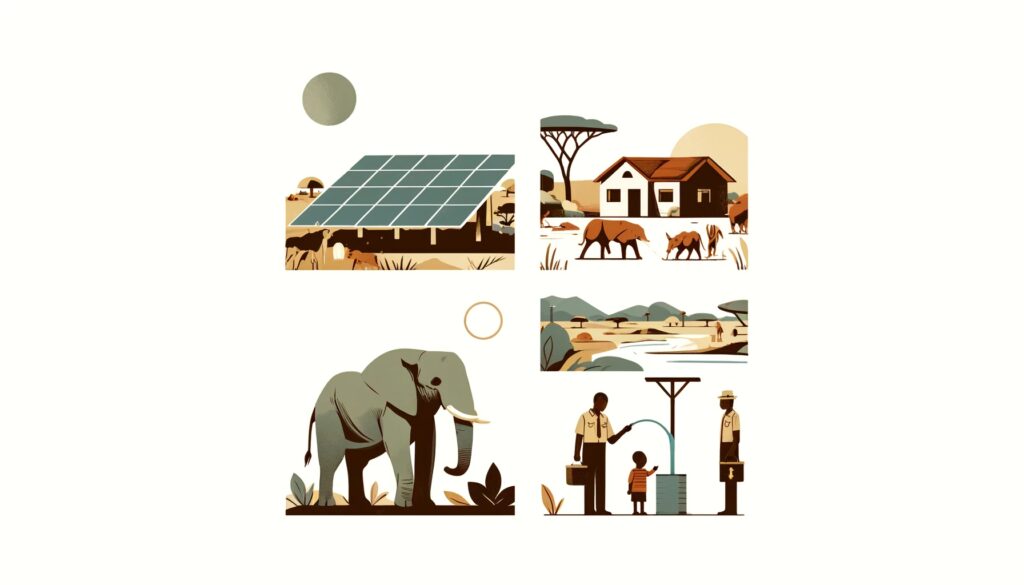
Artificial Intelligence in Africa is experiencing significant growth and transformation across various sectors.
Successful AI Projects in Africa
Zipline (Rwanda and Ghana)
- Overview: Zipline uses drones to deliver medical supplies, including blood and vaccines, to remote and hard-to-reach areas.
- Impact: This project has significantly reduced delivery times for essential medical supplies, improving healthcare outcomes and saving lives in rural communities.
FarmDrive (Kenya)
- Overview: FarmDrive uses AI and mobile technology to provide credit scoring for smallholder farmers who lack traditional credit histories.
- Impact: By analyzing data such as weather patterns, soil conditions, and crop yields, FarmDrive enables financial institutions to offer loans to farmers, boosting agricultural productivity and financial inclusion.
Cortex Logic (South Africa)
- Overview: Cortex Logic leverages AI to provide solutions across various industries, including healthcare, finance, and retail.
- Impact: Their AI-driven platforms help businesses optimize operations, improve decision-making, and enhance customer experiences, contributing to economic growth and innovation.
4IR in Agriculture (Nigeria)
- Overview: This project, part of the Fourth Industrial Revolution (4IR) initiative, uses AI to monitor and improve agricultural practices.
- Impact: By providing farmers with real-time data on soil health, weather conditions, and pest control, it helps increase crop yields and sustainability.
SunCulture (Kenya)
- Overview: SunCulture uses AI to develop solar-powered irrigation systems that are affordable and efficient.
- Impact: These systems help smallholder farmers increase their productivity and profitability while conserving water and reducing reliance on rain-fed agriculture.
Apollo Agriculture (Kenya)
- Overview: Apollo Agriculture uses machine learning and satellite imagery to provide farmers with customized farming advice, financial services, and inputs.
- Impact: The project has improved farmers’ productivity and income by offering personalized support and resources based on data analysis.
Tuteria (Nigeria)
- Overview: Tuteria is an online platform that uses AI to connect students with qualified tutors for personalized learning experiences.
- Impact: It enhances educational opportunities by providing accessible and affordable tutoring, improving academic performance and skills development.
M-Shule (Kenya)
- Overview: M-Shule is an AI-powered mobile learning platform that provides personalized education content to primary school students via SMS.
- Impact: It has improved learning outcomes by offering tailored lessons and assessments, particularly in underserved communities with limited access to traditional educational resources.
Deep Learning Indaba (Pan-African)
- Overview: Deep Learning Indaba is an initiative aimed at strengthening African AI communities by organizing workshops, conferences, and research collaborations.
- Impact: It promotes knowledge sharing, capacity building, and networking among AI researchers and practitioners across Africa, fostering innovation and development in the field.
MTN Chatbot (South Africa)
- Overview: MTN, a major telecommunications company, uses AI-powered chatbots to enhance customer service and support.
- Impact: The chatbot provides instant responses to customer inquiries, improves service efficiency, and reduces wait times, enhancing overall customer satisfaction.
By leveraging these inherent strengths and opportunities, Africa can harness the transformative potential of AI to address pressing challenges, drive inclusive growth, and unlock new opportunities for development and prosperity across the continent.
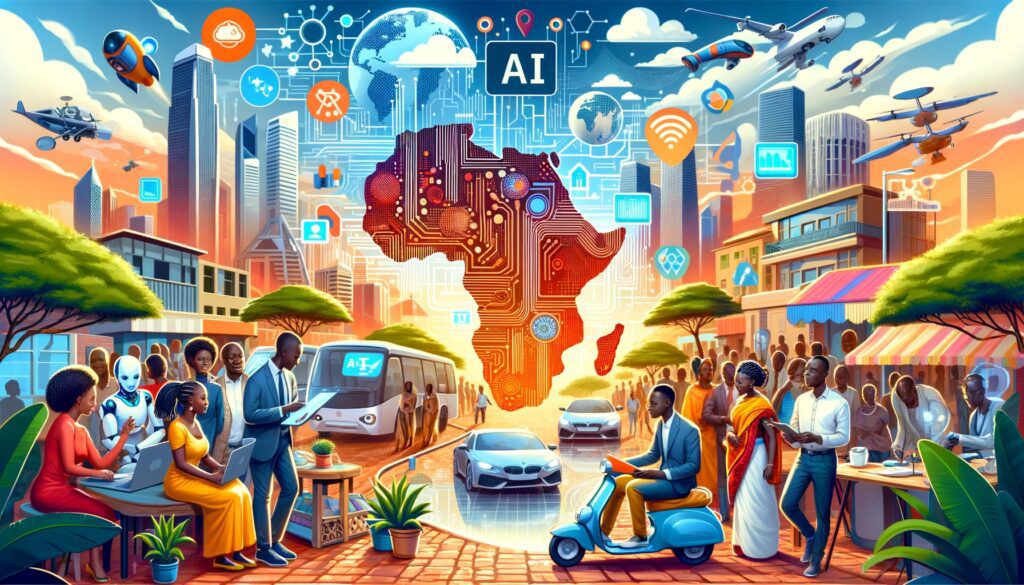
AIFA (AI for Africa): Goals
The AI for Africa (AIFA) Foundation, founded in 2023, is a non-profit organization dedicated to promoting the use of artificial intelligence (AI) for social good in Africa. Its mission includes supporting AI research and education and leveraging AI to tackle critical issues such as poverty, disease, and climate change.
Image Credit: aiforafrica.org
The goal is to develop artificial intelligence in Africa. To achieve this, AIFA is committed to:
- Investing in Education and Training:
- Provide students with high-quality education in computer science and mathematics.
- Offer training programs for professionals interested in AI.
- Creating Partnerships between Academia and Industry:
- Facilitate collaborations between researchers and businesses to develop AI applications.
- Ensure research addresses the specific needs of the African continent.
- Promoting Entrepreneurship:
- Foster a vibrant ecosystem for developing and marketing new AI ideas.
- Support startups and innovators in the AI space.
- Attracting Investment:
- Leverage Africa’s potential to draw investment for AI development.
- Secure resources necessary for advancing AI technologies.
- Building a Strong AI Community:
- Create online forums and meetups for idea sharing and project collaboration.
- Establish a supportive environment for AI development across Africa.
By focusing on these areas, AIFA aims to lay a solid foundation for AI innovation and growth in Africa, overcoming complex challenges and ensuring a bright future for AI on the continent.
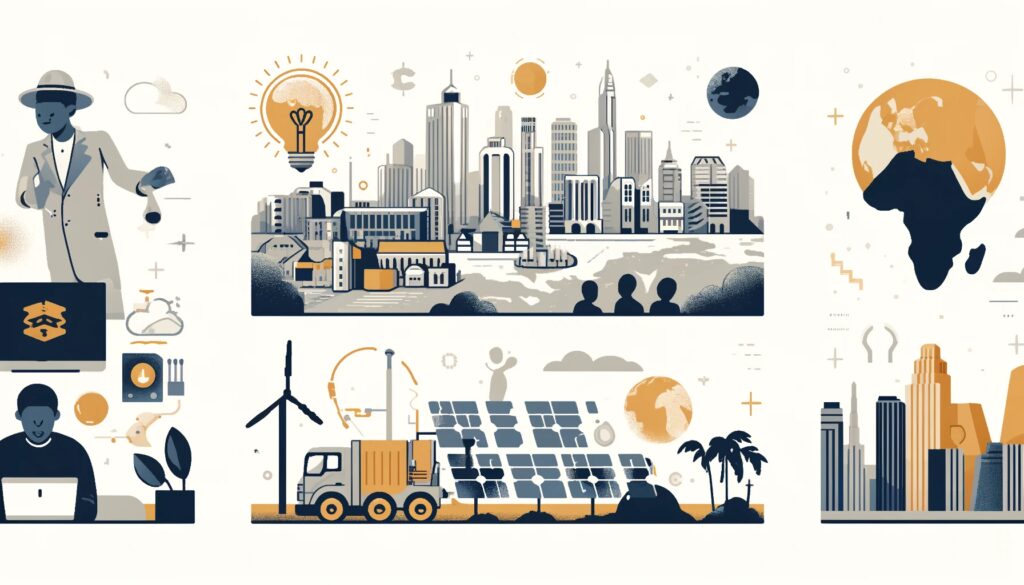
How can African startups access funding for AI projects?
African startups can access funding for AI projects through a variety of channels and strategies:
Venture Capital and Angel Investors
- Local and International VCs: Many venture capital firms are interested in African tech startups. Examples include 4DX Ventures, Partech Africa, and TLcom Capital.
- Angel Investors: Networks like the African Business Angel Network (ABAN) connect startups with individual investors.
Government Grants and Programs
- Local Government Initiatives: Some African governments offer grants and support programs for tech innovation. Examples include South Africa’s Technology Innovation Agency (TIA) and Kenya’s ICT Authority.
- Pan-African Initiatives: Programs like the African Innovation Foundation’s Innovation Prize for Africa provide funding and support.
International Development Funds and NGOs
- World Bank and IFC: These organizations have various funding programs for technology and innovation projects in developing countries.
- USAID: The United States Agency for International Development funds tech projects through initiatives like Development Innovation Ventures.
Corporate Partnerships and Investments
- Tech Giants: Companies like Google, Microsoft, and IBM have initiatives and funds aimed at supporting AI and tech startups in Africa.
- Corporate Social Responsibility (CSR) Programs: Large African companies may have CSR programs that fund innovative projects.
Accelerators and Incubators
- Google for Startups Accelerator: AI First (Africa): A 10-week equity-free accelerator program for Seed to Series A startups based in Africa or building Africa-centered solutions with technology. The program is sector-agnostic but focuses on startups leveraging Artificial Intelligence & Machine Learning.
- Google for Startups Accelerator: Africa: Similar to the AI First program, this accelerator supports growth-stage startups solving problems using advanced technology, such as AI/ML or data across key verticals. It offers access to Google engineers, technical project partnership, Google product support and advice, custom mentorship, and inclusion in the Google for Startups Accelerator Global Community.
- Y Combinator: Although based in the US, Y Combinator has funded several African startups.
- Local Accelerators: Organizations like MEST Africa, CcHub, and Startupbootcamp AfriTech provide funding, mentorship, and resources.
Crowdfunding Platforms
- Kickstarter and Indiegogo: These platforms can be used to raise funds from a global audience.
- Afrikstart: A crowdfunding platform specifically for African startups.
Competitions and Prizes
- Innovation Challenges: Competitions like the Hult Prize, MIT Solve, and the GoGettaz Agripreneur Prize offer significant funding to winners.
- Pitch Competitions: Events like Seedstars World and the African Innovation Summit provide platforms to pitch for funding.
University and Research Institution Grants
- Academic Partnerships: Collaborating with universities can provide access to research grants and funding opportunities.
- Innovation Hubs: University-affiliated innovation hubs often have funding for tech startups.
Impact Investors
- Social Impact Funds: Organizations like Acumen and the Impact Investment Exchange fund projects that have a social impact, including AI initiatives.
- Development Finance Institutions (DFIs): DFIs like the African Development Bank offer funding for projects that drive development.
Grants from International Organizations
- Gates Foundation: Funds innovative health and development projects, including those involving AI.
- UN Agencies: Agencies like UNDP and UNICEF offer grants for tech solutions addressing global challenges.
Tips for Accessing Funding:
- Strong Business Plan: Ensure your AI project has a clear, scalable business model and a strong value proposition.
- Networking: Engage with the tech community through events, online forums, and networking groups to build connections with potential investors.
- Mentorship: Seek mentorship from experienced entrepreneurs and advisors who can provide guidance and introductions to funding sources.
- Pitch Preparation: Develop a compelling pitch that clearly communicates the potential impact and scalability of your AI project.
- Leverage Local Ecosystems: Utilize local tech hubs, innovation centers, and startup communities to gain visibility and access to resources.
By leveraging these diverse funding sources and strategies, African startups can secure the financial support needed to develop and scale their AI projects.
There are several AI accelerators specifically tailored for African startups:
- Google for Startups Accelerator: AI First: This is a 10-week, equity-free accelerator program designed for seed to Series A startups based in Africa or building Africa-centered solutions using AI and machine learning. Participants receive access to Google’s AI expertise, technical resources, and a significant amount of Google Cloud credits. The program also includes mentorship and networking opportunities to help startups scale their businesses (blog.google).
- FAST Accelerator: Supported by Microsoft in collaboration with Flapmax, this accelerator is designed to strengthen and scale Africa’s digital ecosystem. It includes an online bootcamp followed by a comprehensive acceleration experience. Participants receive training in AI integration, business development, fundraising, and go-to-market enablement. The program offers support from Microsoft and Intel for applying AI models and scaling their use on platforms like Microsoft Azure (Disrupt Africa).
These accelerators aim to empower African startups by providing them with the necessary tools, expertise, and networking opportunities to grow and innovate in the AI space.
Exploring AI Frontiers: Key Interview Topics with African Innovators
Interview with an African AI Startup Founder
Questions:
- What inspired you to start an AI-focused company in Africa?
- What challenges did you face in the initial stages of your startup?
- How has the local entrepreneurial ecosystem supported your journey?
- Can you share a success story or a major milestone your company has achieved?
- What advice would you give to other aspiring AI entrepreneurs in Africa?
Interview with a Government Official on AI Policy
Questions:
- How is the government supporting AI development and innovation in Africa?
- What policies and initiatives are in place to promote AI education and research?
- How does the government address ethical concerns and data privacy in AI projects?
- What role do international collaborations play in your AI strategy?
- Can you discuss any successful AI projects or partnerships led by the government?
Interview with an AI Researcher or Academic
Questions:
- What are the key areas of AI research being pursued in Africa?
- How does your research address local challenges and contribute to sustainable development?
- What collaborations or partnerships have been instrumental in your work?
- How do you see the future of AI research evolving in Africa?
- What are the biggest opportunities for young researchers and students interested in AI?
Interview with an NGO or Non-Profit Organization Leader
Questions:
- How is your organization leveraging AI to address social issues in Africa?
- Can you share examples of successful AI-driven projects or initiatives?
- What challenges do you encounter in implementing AI solutions at the grassroots level?
- How do you ensure inclusivity and community engagement in your AI projects?
- What are the most pressing needs for NGOs and non-profits working with AI in Africa?
Interview with an International Tech Company Representative
Questions:
- How is your company contributing to the development of AI in Africa?
- What investments or partnerships have you made in the African AI ecosystem?
- Can you discuss any innovative AI projects your company has implemented in Africa?
- How do you navigate the challenges of infrastructure and data availability in Africa?
- What future plans does your company have for expanding AI initiatives in Africa?
Interview with an AI Educator or Trainer
Questions:
- How are you addressing the skills gap in AI education in Africa?
- What programs or initiatives have been most effective in training AI talent?
- How do you tailor your curriculum to meet the unique needs of African students?
- What role do online learning platforms play in AI education in Africa?
- Can you share success stories of students who have excelled in AI after completing your programs?
These interviews can provide a comprehensive understanding of the diverse perspectives and efforts shaping AI development in Africa.
Finance AdvisorPolite to AI
